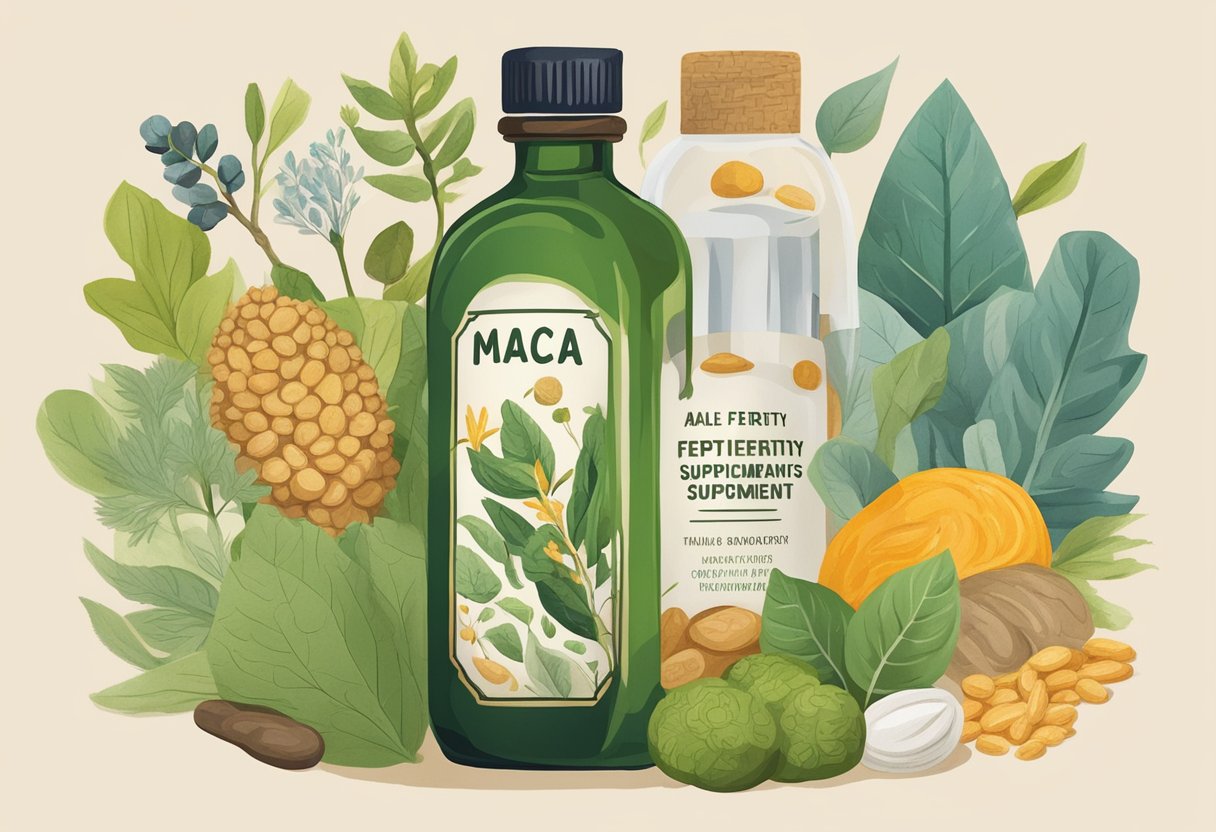Male fertility has become a topic of increasing concern as couples face challenges in conceiving.
Many factors contribute to male reproductive health, including genetics, lifestyle choices, and environmental influences.
In response to this, there has been a growing interest in the potential role of dietary supplements in improving male fertility.
These male fertility supplements often contain a blend of vitamins, minerals, and other nutrients touted to enhance sperm quality and boost reproductive function.

Scientific scrutiny into these products reveals a nuanced picture.
Some ingredients commonly found in male fertility supplements have shown promise in improving certain parameters of sperm health.
Nutrients such as antioxidants are suggested by studies to play a role in protecting sperm from oxidative damage, potentially leading to improved outcomes.
Conversely, there are also many ingredients within these supplements that lack robust evidence to support their efficacy in enhancing fertility.
Understanding Male Fertility
In examining the complexities of male fertility, it is crucial to acknowledge the multifaceted nature of spermatogenesis and the array of factors that impact reproductive health.
The ensuing discussion delves into key components and considerations.
Role of Nutrients in Sperm Health
Nutrients serve as foundational building blocks for optimal sperm health.
Zinc and selenium are elemental in the formation and function of sperm; zinc is critical for testosterone production and sperm development, while selenium plays a part in preventing oxidative damage.
-
Essential Nutrients for Sperm Quality and Count:
- Zinc: Supports testosterone production.
- Selenium: Aids in protecting sperm cells.
- Vitamin C: Antioxidant that improves motility.
- Vitamin D: Linked to sperm motility and morphology.
Factors Influencing Male Fertility
Male fertility can be shaped by a diverse spectrum of factors, ranging from genetic predispositions to environmental exposures.
Hormones regulate and influence sperm production, while factors such as obesity are known to cause hormonal imbalances that may lead to reduced fertility.
Additionally, exposure to certain chemicals can detrimentally affect sperm count and quality.
-
Influential Factors:
- Genetic elements
- Hormonal levels
- Environmental chemicals
The Impact of Lifestyle Choices
Lifestyle choices significantly sway male fertility.
A diet high in processed foods can dampen libido and exacerbate infertility, and practices such as smoking or excessive alcohol consumption are detrimental to sperm count and motility.
Conversely, maintaining a healthy diet rich in key vitamins and nutrients can enhance reproductive health.
-
Lifestyle Factors:
- Smoking: Negatively affects sperm count and motility.
- Alcohol: Can reduce sperm quality and fertility potential.
- Diet: Quality directly impacts sperm health.
- Exercise: Influences testosterone levels and fertility.
Key Supplements for Male Fertility

The selection of supplements for male fertility focuses on key nutrients known for supporting sperm quality and count.
Critical elements include vitamins, minerals, and various compounds that can influence male reproductive health.
Essential Vitamins and Minerals
Zinc and selenium are two vital minerals associated with healthy sperm production and potency.
Zinc plays a crucial role in testosterone synthesis and cell division, directly affecting sperm count and motility.
Studies suggest that selenium contributes to sperm formation and can protect sperm from oxidative damage.
- Vitamin C and Vitamin D: These vitamins are pivotal as antioxidants that assist in safeguarding sperm DNA from free radical damage. Vitamin D also influences testosterone levels, which is significant for male fertility.
- Folate: Adequate intake of folic acid is not only crucial for preventing neural tube defects but also contributes to sperm health and DNA integrity.
Herbal and Amino Acid Supplements
Amino acids like L-carnitine and L-arginine are commonly researched regarding their potential in supporting male fertility.
L-carnitine is found to be essential in sperm metabolism, providing the energy necessary for movement, while L-arginine may improve circulation, benefitting sperm production and function.
D-Aspartic Acid: Research indicates that this amino acid might play a role in testosterone production, potentially improving low sperm counts.
Combination Supplements and Multivitamins
Multivitamins usually provide a broad spectrum of necessary nutrients, combining active ingredients like B-vitamins, Coenzyme Q10 (CoQ10), and Omega-3 fatty acids.
CoQ10 and Omega-3: These nutrients are known for their antioxidant properties and their role in membrane fluidity, which can enhance the overall quality of sperm.
CoQ10 is also integral to energy production within sperm cells, improving their motility and function.
Influence of Nutritional Intake on Male Reproductive Health

Nutritional intake plays a critical role in male reproductive health, directly impacting sperm quality and fertility.
Diet rich in certain nutrients and particular dietary patterns can significantly influence these aspects of reproductive function.
Whole Foods & Fertility
A diet incorporating a variety of whole foods can contribute to improved sperm quality.
Foods such as fish, nuts, and a range of fruits and vegetables are associated with better sperm parameters.
For instance, omega-3 fatty acids, predominantly found in fish, are known to improve sperm motility and morphology.
Nuts, especially brazil nuts, are a good source of selenium and vitamin E, which help protect sperm from damage caused by free radicals.
Fruits and vegetables are rich in antioxidants, such as vitamin C and folate, which are crucial in maintaining a healthy sperm count and reducing oxidative stress.
Effects of Specific Diet Patterns
Specific diet patterns have been shown to affect male fertility.
A balanced diet that includes meat, whole eggs, and vegetables provides an ample supply of B vitamins and other nutrients essential for maintaining a healthy libido and reproduction capacity.
Conversely, diets that are high in processed foods and low in key micronutrients like vitamin E and omega-3 fatty acids can have a negative impact.
Research indicates that dietary supplements containing trace elements and vitamins can also be influential. However, moderation is key, as excessive intake might lead to counterproductive effects.
Maintaining a healthy diet not only supports general well-being but is also linked to potent aphrodisiac qualities in foods such as nuts, which have been linked to an increased sexual health.
Lifestyle and Environmental Considerations

Optimising lifestyle and environmental factors is crucial for maintaining and potentially improving male fertility.
Factors such as body weight and exercise routines, alongside avoiding detrimental habits like excessive alcohol consumption and smoking, play significant roles in sperm quality and reproductive health.
Managing Body Weight and Exercise
Maintaining a healthy weight is essential for improving sperm count and motility.
Obesity has been associated with lowered testosterone levels and an increase in other hormones that can negatively impact sperm production and health.
Regular exercise contributes to weight management and may enhance testosterone levels, benefiting sperm concentration and overall fertility.
However, excessive physical strain and exposure to heat in activities such as cycling can adversely affect sperm count and testicle health.
Avoiding Detrimental Habits
Alcohol intake should be moderated, as heavy drinking can lead to reduced libido, erectile dysfunction, and a decrease in sperm quality.
Smoking cigarettes introduces free radicals to the body, which can damage sperm DNA and lead to decreased sperm motility and count.
Lifestyle choices that include a diet high in healthy fats and low in processed foods are recommended, as they help combat the negative effects of our modern lifestyle on reproductive health.
Monitoring and Improving Male Fertility
Regular Men's Health Check-Ups
To address male infertility, it is essential to concentrate on enhancing sperm quality and overall semen parameters.
Regular health check-ups and advancements in testing play pivotal roles in fertility improvements.
Regular health assessments are crucial for men to monitor changes in fertility.
Such check-ups should include a comprehensive semen analysis, which evaluates sperm count, motility, and morphology.
Lifestyle choices, including alcohol consumption and exercise habits, have significant impacts on these key sperm parameters.
Modifying behaviours, as well as incorporating certain nutrients and fertility supplements, can foster improvements.
Men are advised to mitigate factors like stress and exposure to toxins, which can lead to hormone imbalances and affect fertility.
Inositol, a nutrient associated with modulating cellular processes in sperm, is often recommended to improve sperm quality and libido.
Advancements in Fertility Testing and Treatment
In the ambit of male infertility, significant progress has been made in diagnostic and treatment methodologies.
Genetic testing can unravel underlying hereditary issues affecting fertility.
With modern lifestyle influences, in-house testing options have become more prevalent, enabling men to perform preliminary assessments privately.
Treatments have evolved to include sophisticated assisted reproductive technologies like in vitro fertilisation (IVF).
These techniques often employ detailed semen analysis to ensure optimal sperm are used.
Advanced treatments also address specific issues such as low sperm count and poor motility, aiming to enhance the likelihood of successful conception.
Frequently Asked Questions
This section explores common enquiries regarding the supplementation of male fertility.
It addresses which vitamins are beneficial, the impact of supplements on sperm health, and which specific ingredients are essential for reproductive wellness.
What vitamins have been shown to improve male fertility?
Evidence suggests that certain vitamins may enhance male fertility.
For instance, antioxidants like vitamins C and E are known to improve sperm quality by reducing oxidative stress.
How can dietary supplements impact sperm morphology and overall male reproductive health?
Dietary supplements, especially those with omega-3 fatty acids and Coenzyme Q10, have been linked to improved sperm morphology and motility, contributing to better reproductive outcomes.
What are the top-rated male fertility supplements available in the UK?
Top-rated male fertility supplements in the UK often include those that combine zinc, folic acid, and selenium, known for their supportive role in male fertility.
How do specific supplements contribute to male reproductive health?
Specific supplements can contribute to male reproductive health by providing essential nutrients that support various aspects of sperm function.
For example, zinc plays a critical role in DNA synthesis and sperm production.
Which ingredients should be looked for in effective male fertility supplements?
Effective male fertility supplements should contain ingredients like L-carnitine, Coenzyme Q10, and vitamins C and E, all of which assist in protecting sperm cells from oxidative stress and improving motility.
Are there any National Health Service recommended supplements for enhancing male fertility?
Currently, the National Health Service (NHS) does not explicitly recommend specific brands of supplements for male fertility.
However, they do acknowledge the importance of micronutrients such as zinc and selenium in reproductive health.
